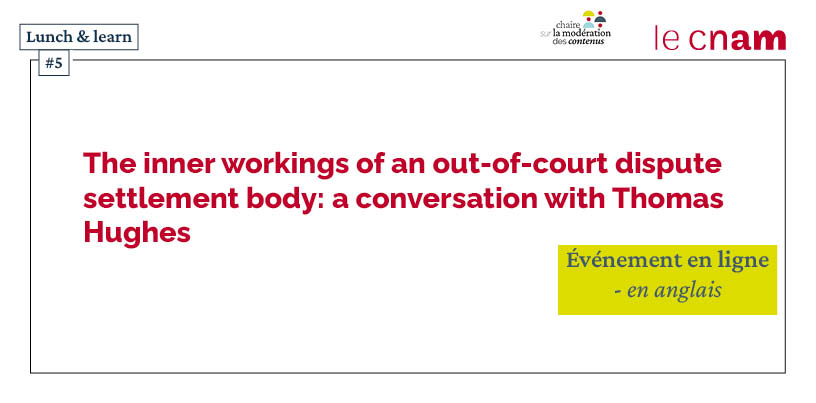The inner workings of an out-of-court dispute settlement body: a conversation with Thomas Hughes

7 octobre 202512h30 - 13h30
Le cinquième Lunch and Learn, intitulé « The inner workings of an out-of-court dispute settlement body: a conversation with Thomas Hughes » se déroulera en anglais, voici la description de l’évènement directement en anglais :
« Curtailing illegal and harmful speech online is a major challenge. Regulatory approaches at the regional and national level seek to prevent “torrents of hate coming over the Internet”, as French President Emmanuel Macron put it in 2018. Yet, in moderating content, platforms make mistakes. A 2024 report by The Future of Free Speech found that “a substantial majority (87.5% to 99.7%) of deleted comments on Facebook and YouTube in France, Germany, and Sweden were legally permissible, suggesting that platforms, pages, or channels may be over-removing content to avoid regulatory penalties”. Under the EU Digital Services Act, users are given the possibility to challenge content moderation decisions by lodging a complaint to an out-of-court dispute settlement (ODS) body. But to what extent do these mechanisms truly empower users to challenge platforms’ content decisions? How do decisions taken by these bodies contribute to the enforcement and effectiveness of the DSA? With Thomas Hughes, CEO of Appeals Centre, one of the certified ODS body pursuant to Article 21 of the DSA, we will explore the inner workings of these bodies, including the value of these decisions for the DSA machinery and their potential contribution to the definition of “systemic risks”. »
Dans la même rubrique
- Accueil
- Agenda
- Medias-Cnam
- Vient de paraître
-
Expositions virtuelles
- Plus belle la mécanique
- le Cnam, 230 ans d’histoire
- L'abbé Grégoire, un héritage toujours vivant/
- Main tenant/
- La bibliothèque du Cnam, hier & aujourd'hui/
- Objets du Musée/
- Décalcomanie/
- Répare-moi si tu peux/
- Exploração/
- Le Piano oriental/
- 5 sens et 9e art/
- Surimpressions/
- Le Cnam : 70 ans d'engagement sur les territoires
- Détours verts : le futur des transports/
- Out of Home/
- The Shoe Must Go On/
- Simplement Afghanes/
- Exils syriens/
- Made in Cnam/
- Station 9e art/
- Itinéraires/
- Infinités plurielles/
- Histoires d'objets/
- Roms entre autres/
- La déportation des enfants juifs du 3e arrondissement
- Bibliothèques (SCD)
- Conservatoire numérique des Arts et Métiers (Cnum)
- Musée des Arts et Métiers















